I know that this information lives elsewhere, but this February 11 RevCon document has a pretty good summary of the history behind the Zangger Committee.
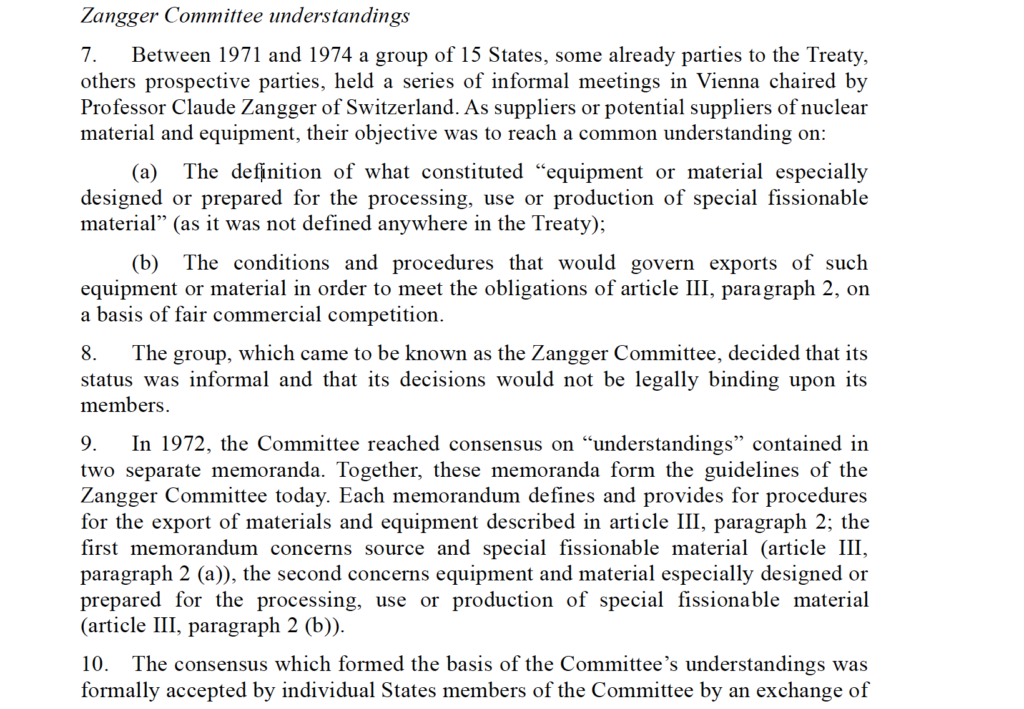
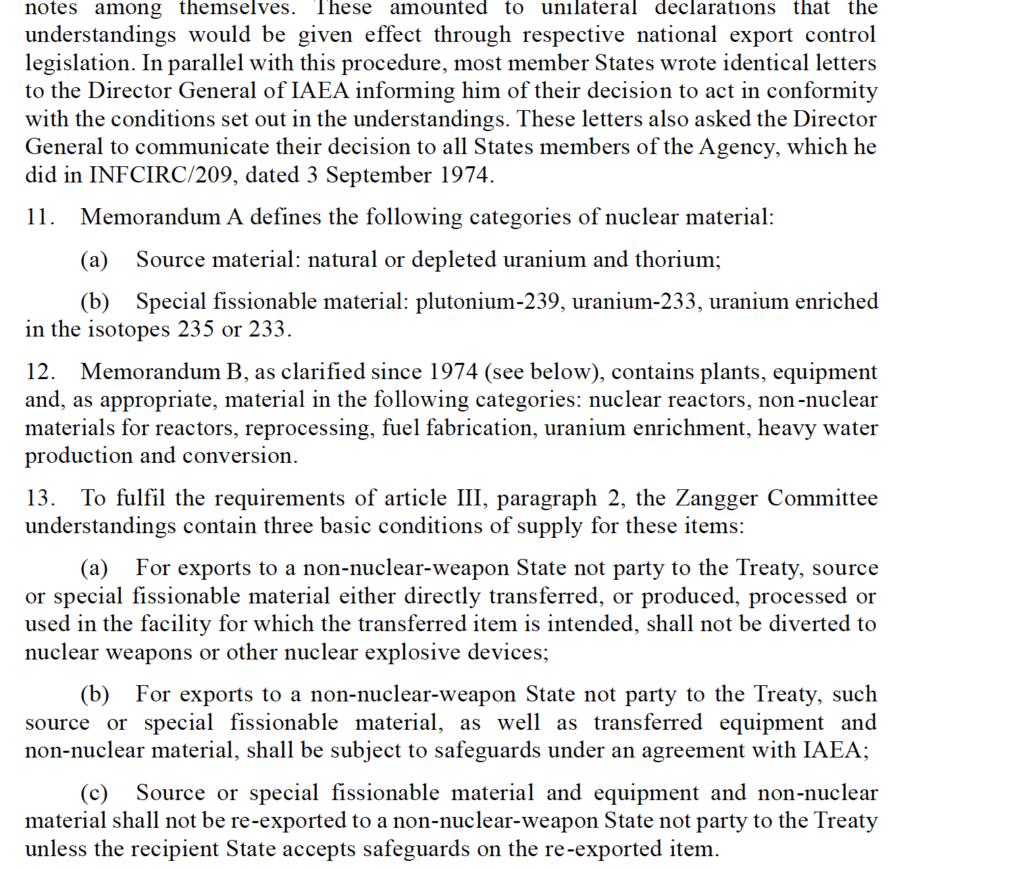
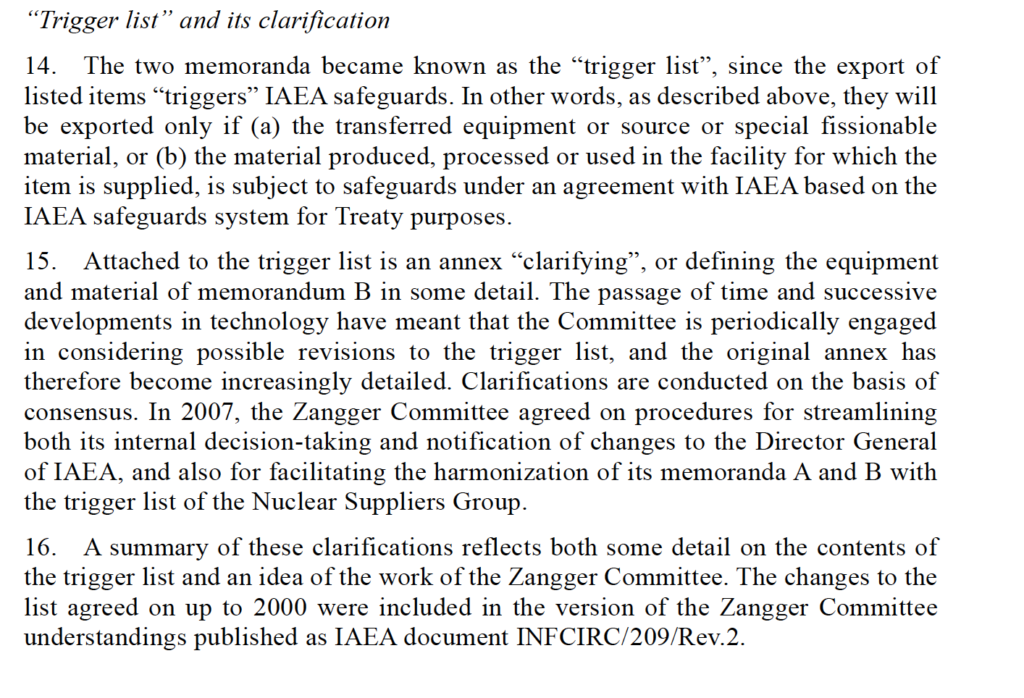
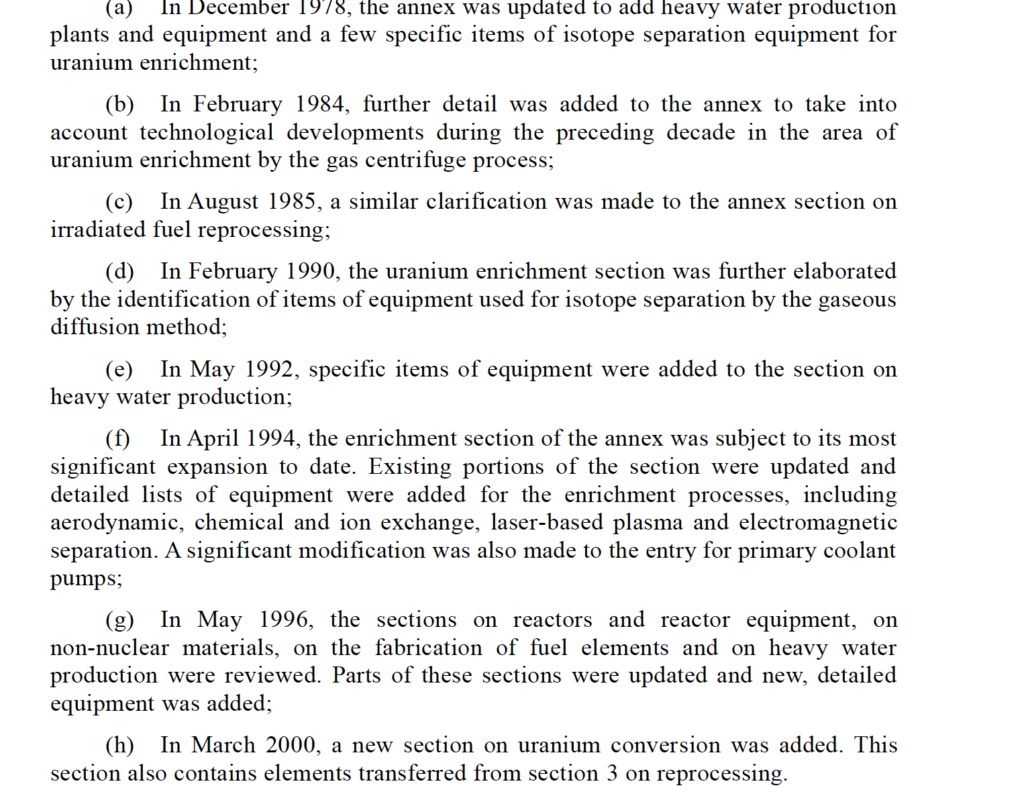
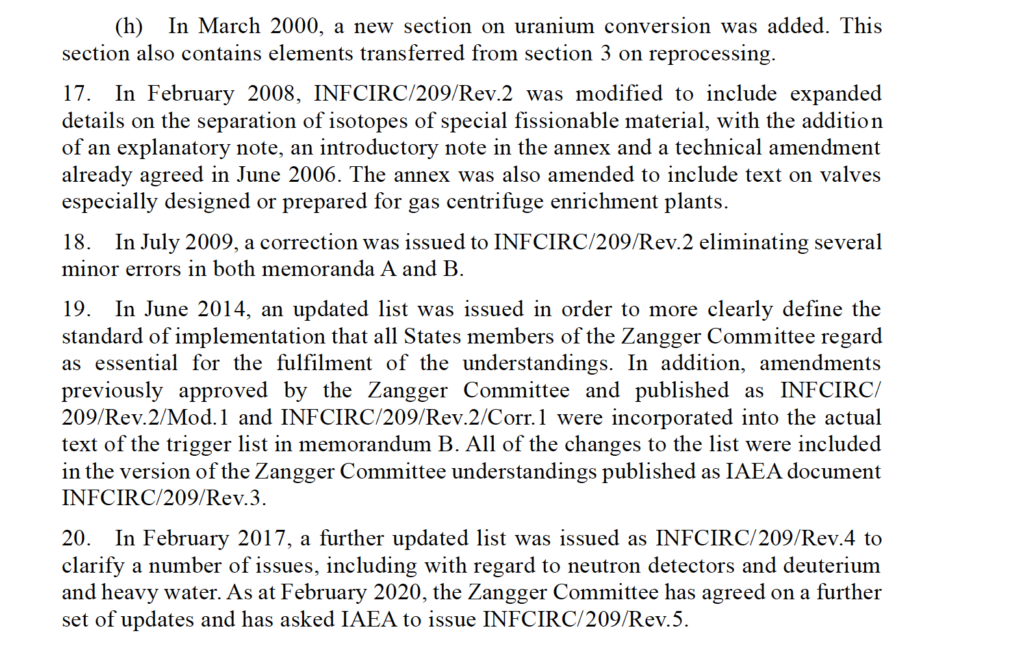

I know that this information lives elsewhere, but this February 11 RevCon document has a pretty good summary of the history behind the Zangger Committee.





Lt General (Retd) Khalid Kidwai: Deterrence, Nuclear Weapons and Arms Control – Keynote Address (IISS Event) 6 Feb 2020:
I can still milk this for a while.
In his lengthy 2006 interview, Tyler Drumheller discussed the role of intelligence from Iraqi emigres. Drumheller noted: “I believe there was serious consideration, at least briefly, given to the ‘Afghanistan solution’ for Iraq. Then by the summer [of 2002], it was clear we were going to war with Iraq.”
He explained further:
…a lot of it was driven by émigré reporting. Also during that spring, Dr. Rice made a speech when she said, “We don’t want the smoking gun to be a mushroom cloud,” and the vice president said, “There’s no doubt that they have [reconstituted their nuclear program].” That had to come from these émigré sources, because we weren’t reporting that. Even the Pentagon wasn’t reporting that, that I saw.
He also weighed in on European intel services’ view of the Iraq WMD threat, as well as what the intel actually said:
They always say, “Well, all these other European services and all these other countries around the world felt the same way.” Well, no, it wasn’t exactly the same way. They were all concerned; there was a general fear that Saddam was building [weapons] because Saddam was Saddam. … It’s the way he kept his enemies inside and outside the country off balance. This general view developed that the inspectors were a bunch of clowns, which wasn’t true. The inspectors are very serious guys, and they actually did an effective job — not perfect, but they were pretty effective. But the intelligence that was coming in was saying that there aren’t any weapons, the actual hard intelligence... most of it’s coming from the inspectors — I mean, not intelligence reporting from the inspectors through the IAEA [International Atomic Energy Agency], but we had other very sensitive stuff.
Lastly, this is what he had to say about political pressure on the IC:
…the Silberman-Robb [commission] report and the SSCI report would say there was no direct political pressure [on the intelligence community], and that’s true. Nobody ever came up and said, “Write this NIE [National Intelligence Estimate] in that way.” But if you’ve been around Washington long enough, you know when there’s pressure. These are bureaucracies: The CIA is a bureaucracy; the Pentagon is a bureaucracy. People want to get ahead, and the way to get ahead was to move ahead on Iraq. And there were a lot of people that were concerned.
Performed by Sepultura. Lyrics by Jello Biafra.
UNSCR 487 references this 1981 letter from Iraq to the UNSC regarding the Israeli attack on Osirak:
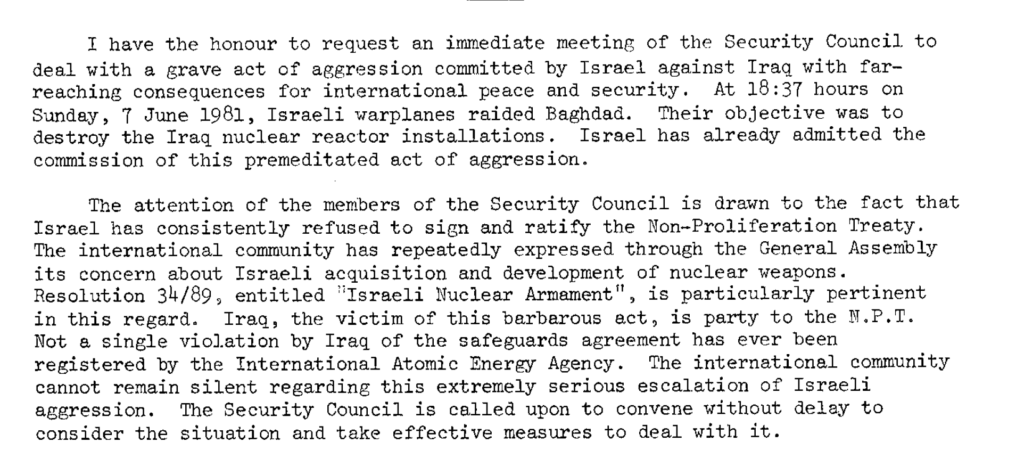
I was re-reading this speech from Christopher Ford when I realized that I had missed this excellent summary of the current India-Pakistan nuclear dynamics:
Indeed, the N5 process conspicuously leaves out two major nuclear weapons possessors — India and Pakistan — who find themselves today in a dangerous arms race that presents perhaps the single most likely scenario for nuclear warfare in the world today. Both are developing an ever-wider and more diverse range of potential delivery systems in ways that are likely to be notably destabilizing. They have not applied the hard-won lessons of our Cold War mistakes, instead following paths that shrewd observers now understand to be dangerous and destabilizing — for instance, Pakistan’s development of short-range, forward-deployed nuclear weapons of the very sort that NATO by the early 1980s had come to understand were more likely to lead to uncontrollable escalation or loss of control than they were to contribute to stable deterrence.
Meanwhile, Beijing’s nuclear build-up continues to catalyze expansion of New Delhi’s delivery systems — and these dynamics, coupled with cross-border terrorism emanating from Pakistan, are creating destabilizing ripple effects through the subcontinent. (This points, by the way, to yet another benefit of trilateral arms control between the United States, Russia, and China: it has the potential to help reduce arms race pressures in the South Asian context, too.) We have also watched with concern as Pakistan and India engaged in military confrontation under the “nuclear umbrella” of their mutual deterrence, seemingly overconfident in both governments’ ability to manage escalation and avoid catastrophe. Nothing about the South Asian nuclear situation is reassuring at the moment.
In this post, I wrote that, according to Tyler Drumheller, “the Bush administration diverted intel resources from Iran’s nuclear program to Iraq’s nuclear program in February 2001” (my words).
This comment from Robert Kelley (used with his permission) actually caused me to re-examine Drumheller’s words:
February 18, 2020 at 8:48 amInformation provided to IAEA in 2001 on Iraq was largely recycled from 1991. If they diverted resources to Iraq no wonder they got Iran wrong! US information in the 2002 inspections was very thin and usually wrong. They were getting it from Judy Miller.
I considered correcting that post, but I’m not sure it’s wrong, though it may be ambiguous. Here’s what he said:
In the late Clinton administration, in the middle ’90s, there was a large push on Iraq. Then in the late ’90s, as they became more concerned about the nuclear proliferation in Iran, there was a movement of resources from Iraq to Iran. I was in the field then, so I saw that. It was seen as [compared to] Iraq, with the inspectors and with the sanctions and all, that Iran presented a much more dangerous threat than Iraq. Right after the Bush administration came in in February of 2001, we got the word to start gearing up on Iraq, start gearing up [intelligence] collection on Iraq, resources back to Iraq, that these guys were focused on Iraq.
Drumheller did not specify the aspects of Iraq about which the IC began/increased its collection efforts. So maybe the IC wanted extra bodies to focus on non-WMD Iraq issues.
Here’s the June 1981 IAEA BoG resolution, referenced in UNSCR 487, RE: the Osirak attack.
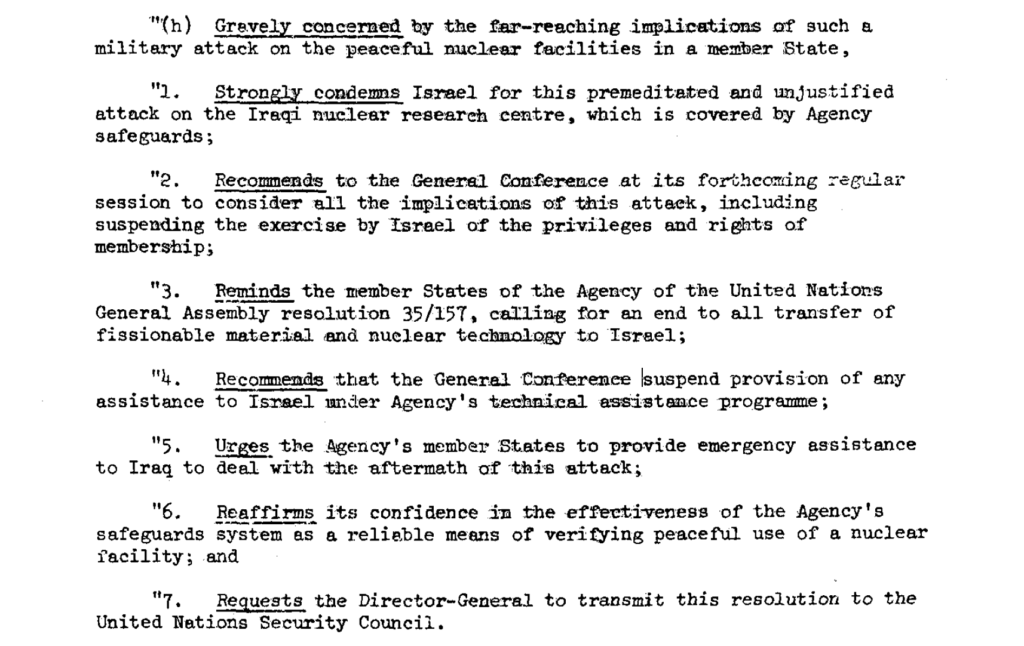
I was struck by the provisions concerning Israel.
The international legal regime governing attacks on nuclear facilities is a subject beyond my expertise. But here’s an excerpt from the 1981 UNSCR adopted in response to Israel’s attack on the Osirak reactor (I am using the Osirak spelling because the CIA does):
3. Further considers that the said attack constitutes a serious threat to the entire IAEA safeguards regime which is the foundation of the non-proliferation Treaty;
4. Fully recognises the inalienable sovereign right of Iraq, and all other States, especially the developing countries, to establish programmes of technological and nuclear development to develop their economy and industry for peaceful purposes in accordance with their present and future needs and consistent with the internationally accepted objectives of preventing nuclear-weapons proliferation;
5. Calls upon Israel urgently to place its nuclear facilities under IAEA safeguards;
6. Considers that Iraq is entitled to appropriate redress for the destruction it has suffered, responsibility for which has been acknowledged by Israel;
Here’s a list, drawn from this list, of the 1980s UNSCRs which refer, directly or indirectly, to CW use during the Iran-Iraq war. I say “indirectly,” because at least one doesn’t mention CW by name, but does refer to UNSCR 598, which contains preambular language deploring the use of CW.
I won’t swear that this is comprehensive, but there you go.